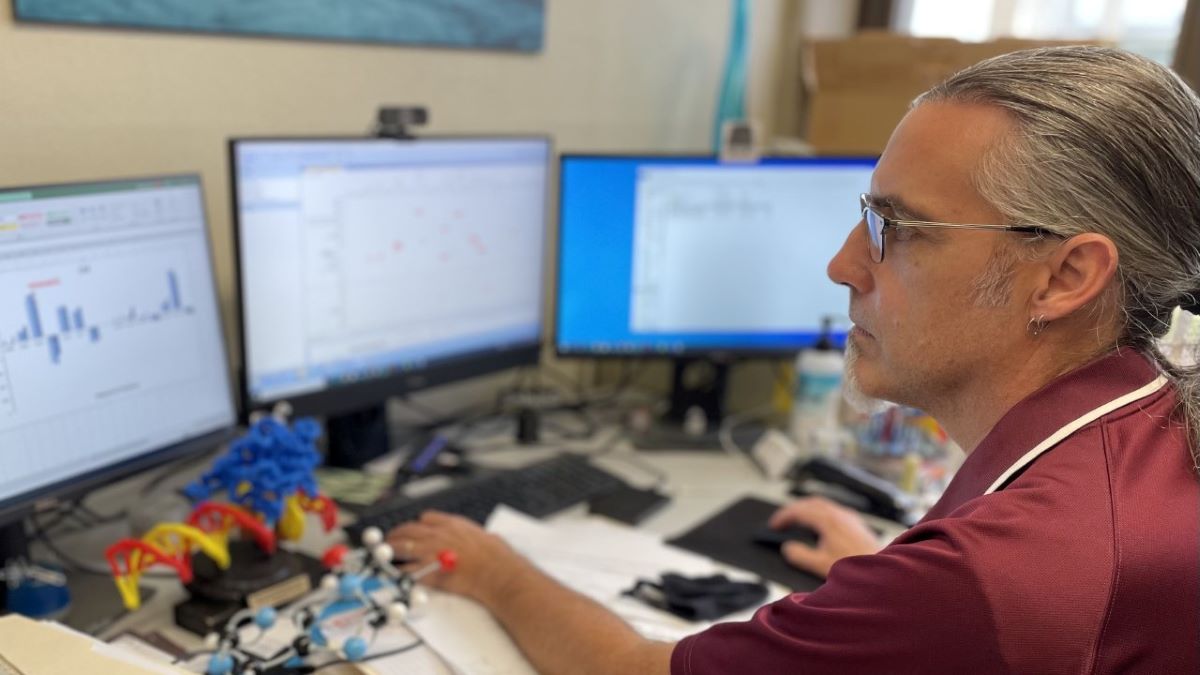What do the origins of cancer, the aging process and immunity all have in common? DNA damage and the need for its repair.
Dr. Gary Meints, associate professor of chemistry, explores DNA repair in his research lab at Missouri State University.
He will bring a world-renowned expert on the subject, Dr. James Stivers, to Springfield this month for a technical lecture at Missouri State and general talk at the Discovery Center of Springfield.
Stivers serves as a professor of pharmacology and molecular sciences at Johns Hopkins University School of Medicine.
His community event will take place from 4-8 p.m. Oct. 20. It will be free and open to the public.
“Dr. Stivers’ talk and associated activities in partnership with the Discovery Center can spur local interest in science,” Meints said. “It will also promote better understanding of the scientific method and encourage people to consider careers in science.”
Meints recently received the Jean Dreyfus Lectureship for Undergraduate Institutions grant from the Camille and Henry Dreyfus Foundation.
The $18,500 award will make the guest lecture, among other research opportunities, possible.
Delving into DNA studies
DNA stretches throughout the body in strands.
Damage to these strands’ chemical structure can be far-reaching, leaving harm throughout the body at all levels of cells they touch.
This makes understanding DNA’s repair process key to supporting human health.
“Dr. Stivers will cover the fundamentals of DNA repair,” Meints said. “He will also show how cellular machinery has evolved to make preventing harm caused by DNA damage possible.”
Why do scientists want to unveil this process? Basic research into fundamental processes can be foundational to future technological advancements.
An example of such a connection between basic research and technological advancement includes magnetic resonance imaging (MRI) technology. It drew from research published decades before its time to become one of the top medical advances, Meints explains.
“Dr. Stivers’ work drawing from basic DNA research has the potential to reach similarly key discoveries,” Meints said. “He is working toward applying his findings to clinical use in cancer treatment and antiviral therapies.”
Learn more about Stivers’ research
Supporting science education
In addition to Stivers’ lectures, the grant will fund the work of two of Meints’ undergraduate students.
These students will get the opportunity to work in Stivers’ lab during the summer semester.
“Johns Hopkins School of Medicine is a top-tier institution in biomedical research,” Meints said. “The opportunities to connect with the university and bring Dr. Stivers as a world-renowned expert in DNA repair to our community were only made possible by the significant generosity of the Dreyfus Foundation.”
About the Camille and Henry Dreyfus Foundation
The Camille and Henry Dreyfus Foundation serves to advance the sciences – including chemistry, chemical engineering and related fields – to improve relationships and conditions among individuals throughout the world.
By providing programs and awards, it strives to address needs and opportunities in the sciences.
The foundation’s title honors Camille Dreyfus, a chemist, inventor and businessman and his brother, Henry Dreyfus.

